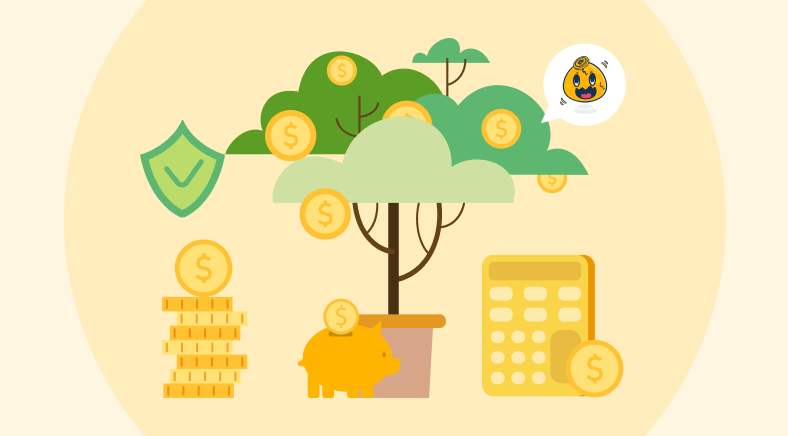
Introduction
In the pursuit of financial freedom, passive income has emerged as a powerful concept. Passive income refers to money earned with little ongoing effort or involvement after an upfront investment of time, funds, or resources. Unlike traditional income, which is earned through direct labor or services, passive income streams allow for ongoing earnings with minimal continuous work. Understanding the best income - generating assets for passive income is crucial for achieving financial goals, whether it's supplementing existing income, building long - term wealth, or attaining the freedom to live life on your own terms. In this article, we will explore some of the top assets that can help you generate passive income.
Real Estate
Rental Properties
Owning rental properties is one of the most traditional and reliable ways to generate passive income. By purchasing a property and renting it out to tenants, you can create a steady stream of income from rent payments. Rental properties can range from single - family homes, duplexes, apartment buildings, to even vacation rentals.
The process typically involves finding a suitable property in an area with high rental demand, screening potential tenants to ensure they are reliable and can pay rent on time, and maintaining the property to keep it in good condition. While managing a property may require some initial effort, such as setting up rental agreements, handling tenant inquiries, and performing occasional maintenance, it can become largely passive once established. Many property owners also opt to hire a property management company to handle day - to - day tasks, further reducing the need for active involvement. However, it's important to note that there are also risks involved, such as the potential for vacancies, unexpected maintenance costs, and changes in the real estate market.
Real Estate Investment Trusts (REITs)
Real Estate Investment Trusts (REITs) offer another way to invest in real estate passively. A REIT is a company that owns, operates, or finances income - producing real estate, such as shopping centers, office buildings, apartments, or hospitals. By investing in a REIT, you are essentially buying shares in a company that manages real estate, and you earn a portion of the income generated by the properties, typically through dividends.
REITs are typically publicly traded on stock exchanges, making them a highly liquid and accessible investment option. Since REITs are required to pay out at least 90% of their taxable income to shareholders as dividends, they can provide a reliable source of passive income. They also offer the advantage of diversification, as a single REIT may own a portfolio of different types of properties across various locations. However, like any investment, REITs are subject to market fluctuations, and their performance can be affected by factors such as interest rate changes, economic conditions, and competition in the real estate market.
Stocks and Dividends
Dividend - Paying Stocks
Adding dividend - paying stocks and funds to your investment portfolio is another reliable way to create passive income. These stocks provide regular payouts to shareholders from the company's profits. By holding shares in well - established companies known for paying dividends, investors can receive a consistent income stream. The amount of the dividend can vary depending on the company's financial performance, with some companies increasing their dividends over time as they grow and become more profitable.
Over time, reinvesting these dividends can lead to compound growth, further increasing earnings potential. For example, if you invest in a stock that pays a 3% dividend and you reinvest those dividends, your investment will grow not only from the increase in the stock price but also from the additional shares you acquire through dividend reinvestment. However, it's important to note that dividend payments are not guaranteed, and companies may reduce or eliminate dividends during periods of financial stress. Additionally, the value of the stock itself can fluctuate, which may result in capital losses.
Exchange - Traded Funds (ETFs)
Exchange - Traded Funds (ETFs) are investment funds that track an index, a commodity, bonds, or a basket of assets. They offer several advantages for generating passive income. One of the main benefits is diversification. Since an ETF typically holds a large number of different assets, it spreads the risk, reducing the impact of any single asset's poor performance on the overall portfolio.
ETFs also have relatively low expense ratios compared to actively managed funds, as they are passively managed to track an underlying index. This cost - efficiency can enhance the overall returns. Some ETFs focus on dividend - paying stocks, allowing investors to gain exposure to a broad range of dividend - paying companies and earn passive income in the form of dividends. They are also highly liquid, as they can be bought and sold on stock exchanges throughout the trading day, just like individual stocks. However, the performance of ETFs is closely tied to the performance of the underlying index or assets they track, and market volatility can still impact their value.
Bonds
Government Bonds
Government bonds are debt securities issued by national governments to finance their spending. They are generally considered one of the safest investments as they are backed by the full faith and credit of the government. When you buy a government bond, you are essentially lending money to the government in exchange for regular interest payments (coupons) and the return of the principal amount at maturity.
The interest rates on government bonds are typically relatively stable, providing a predictable income stream. For example, in the United States, Treasury bonds are a popular choice among investors seeking stability. The longer the maturity of the bond, the higher the interest rate is usually, but also the greater the interest rate risk. Interest rate risk means that if interest rates in the market rise after you purchase a bond, the value of your existing bond may decline. However, if you hold the bond until maturity, you will still receive the full principal amount and all the promised interest payments.
Corporate Bonds
Corporate bonds are issued by companies to raise capital. They offer higher yields compared to government bonds in general, as they carry a higher level of risk. The risk associated with corporate bonds depends on the creditworthiness of the issuing company. Companies with strong financial positions and good credit ratings are more likely to make timely interest payments and repay the principal at maturity.
As an investor in corporate bonds, you receive fixed - rate interest payments at regular intervals, usually semi - annually or annually. The income from corporate bonds can be an attractive source of passive income, especially for investors willing to take on a bit more risk for potentially higher returns. However, if the issuing company faces financial difficulties or defaults, there is a risk that you may not receive all the interest payments or the full principal amount. It's important to research the company's financial health and credit rating before investing in its bonds.
Peer - to - Peer Lending
Peer - to - peer (P2P) lending offers a unique opportunity for passive income by allowing individuals to lend money directly to borrowers through online platforms. These platforms act as intermediaries, connecting lenders with borrowers and handling the loan - origination process, including borrower screening, loan disbursement, and repayment collection.
As a lender, you provide loans to individuals or small businesses, earning interest on the loan as it’s repaid. The interest rates are determined based on factors such as the borrower's creditworthiness, the loan amount, and the loan term. P2P lending platforms make it easy for lenders to diversify their portfolios by spreading their investments across multiple borrowers, reducing the impact of a single borrower defaulting. However, it's not without risks. Default risk is a significant concern, as some borrowers may be unable to repay their loans. Additionally, regulatory changes and the financial stability of the P2P lending platform itself can also affect the returns.
Digital Assets
Royalties from Intellectual Property
Creating and licensing intellectual property (IP) such as books, music, patents, or software can be a lucrative source of passive income. Once you create an IP asset, you can license it to others for use in exchange for royalties. For example, if you write a popular book, you can earn royalties each time the book is sold or licensed for adaptation into other forms like audiobooks or movies.
For musicians, royalties are earned when their music is streamed, played on the radio, or used in commercials or films. Patent holders can license their inventions to companies, receiving a percentage of the revenue generated from the use of the patented technology. The upfront investment in creating intellectual property can be significant, as it requires time, creativity, and often some financial resources. However, if the IP becomes successful, it can generate passive income for years or even decades.
Affiliate Marketing
Affiliate marketing has become a popular way to generate passive income in the digital age. In affiliate marketing, you promote products or services on your website, blog, social media, or other online platforms. When a user clicks on your affiliate link and makes a purchase, you earn a commission from the merchant.
The process involves finding relevant affiliate programs in your niche, signing up for them, and then integrating the affiliate links into your content in a way that is natural and valuable to your audience. For example, if you have a fitness blog, you could promote fitness equipment, supplements, or online workout programs. The key to success in affiliate marketing is to build a targeted and engaged audience, as well as to select high - quality products or services that are relevant to your audience's interests. Once you have set up your affiliate marketing system, it can generate income passively as long as your content continues to attract traffic and drive conversions.
Sharing Idle network with Packetshare
In today's digital age, there's an innovative way to earn passive income by sharing your unused network resources. Packetshare is an app that allows you to do just that. Here's how it works:
First, you need to download and register the Packetshare app. Once you complete the registration, you'll receive an initial reward of 5,000 Packetshare points. The app then enables you to share your mobile or Wi - Fi data. For every 1GB of shared data, you're rewarded with 200 Packetshare points. It's a seamless process that runs in the background, causing no interference with your normal online activities. You can use your device as you usually do while the app quietly monetizes your idle network.
Packetshare also has a referral program. If you invite friends to join using your referral code, you'll permanently receive 10% of your friends' income. This can significantly boost your earnings over time.
When it comes to cashing out, the minimum payout is set at 10. Once you've accumulated enough points, you can easily withdraw your earnings through an automated process on the website. Payment options include PayPal or Wire Transfer, providing you with convenient ways to access your passive income. Every 10,000 Packetshare points can be exchanged for 10. So, if you have a stable and relatively fast internet connection, and you're not fully utilizing your data allowance, Packetshare offers a simple way to turn that unused resource into extra cash.
Conclusion
There are numerous income - generating assets available for those seeking to build passive income streams. Real estate, in the form of rental properties and REITs, offers the potential for stable cash flow and long - term appreciation. Stocks and dividends, along with ETFs, can provide regular income and the opportunity for growth. Bonds offer fixed - income streams with varying levels of risk. Peer - to - peer lending and digital assets such as intellectual property royalties and affiliate marketing present modern and innovative ways to earn passive income. Additionally, sharing your idle network through apps like Packetshare offers a unique way to monetize an often - overlooked resource.
The key is to understand your financial goals, risk tolerance, and investment horizon before choosing the assets that are right for you. In many cases, building a diversified portfolio of these income - generating assets can help you achieve a more stable and substantial passive income, bringing you one step closer to financial freedom.





